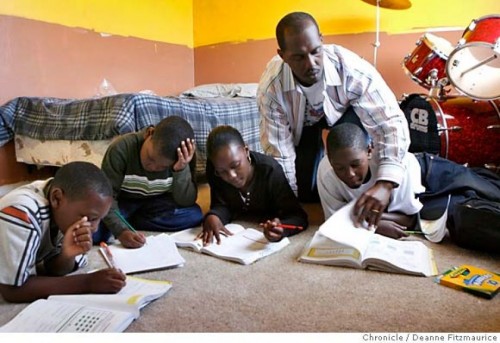When I saw the NPR article about this growing movement of African American home-schoolers, I was not surprised. I am a home-schooler. My wife and I are apart of that movement. We also know several other African American families who have made the decision to educate their children at home.
As the article points out, we, along with the many other families we know have chosen home-schooling for a different reason than traditional home-school families have. We have experienced the knee jerk reaction to that decision when we tell someone that we have chosen to home-school our children. Their response “What? Like Sarah Palin?”, but it’s not quite that way. Our home-school didn’t come about for the reasons White, conservative, and rural families have home-schooled in the past. Our home school doesn’t look like those situations either. We haven’t chosen home-schooling for religious reasons.
As the article points out, a lot of African Americans in large cities are opting for home-schooling for cultural reasons, understanding that the public school system is not ready to reinforce Black culture and help our young people thrive.
As Yo! Philly noted in a recent twitter chat, Black male educators matter. If I were not home-schooling, I’m not sure my children would ever come across one. However, it isn’t just about culture. A lot of families, including mine, are choosing home-schooling for a broader purpose. These reasons include; morals, social development, culture and protecting our little ones from institutionalized racism. It also has to do with academics and knowing that we can likely give our children individual attention and focus that they probably wouldn’t receive in the best public school. Our decision also has to do with safety and cultivating a tight familial bond, in a very busy society.
I’m sure a lot of folks think home-schooling will somehow damage the children. However, the landscape has significantly changed. No longer does home-schooling mean your child is isolated from the broader society or never has the opportunity to interact with their peers, or receive instruction and development from other adults. Between dance class and play groups, moms of preschooler’s meetings, and children church- my children receive plenty of exposure to other adults and their peers. As of matter of fact, I still have no idea where my 4-year-old learned to sing “Watch me whip-whip, Watch me nae-nae”.
The point I’m making here, is what you see among this rapidly growing movement of middle class Blacks in America’s urban center is a willingness to look at the landscape, notice things have changed, and have the courage and willingness to innovate and consider new methods of educating children. As this movement grows, I think public schools everywhere will want to take a note from it. A lot has changed in our society since the prevailing model of schooling was developed. One thing we have come to know, is that just because this is the way we’ve always done it, doesn’t mean it’s the way we should continue to do it. Does that mean all families need to homeschool or public schools need to become a network of home schooling families? Absolutely not. But it does mean it’s time for educators everywhere to join our movement from an ideological perspective. It’s time for educators everywhere to look afresh at the landscape, push the envelope, and challenge ourselves to do things differently and better.
Latest posts by Chris Butler (see all)
- Fellow Parents of Color, We Really Can Do This Homeschooling Thing - April 13, 2020
- Elected School Board Is A Distraction, Not A Solution - March 20, 2017
- 3 Stupid, Racist Responses to Chance’s $1 Million Dollar Action - March 7, 2017
